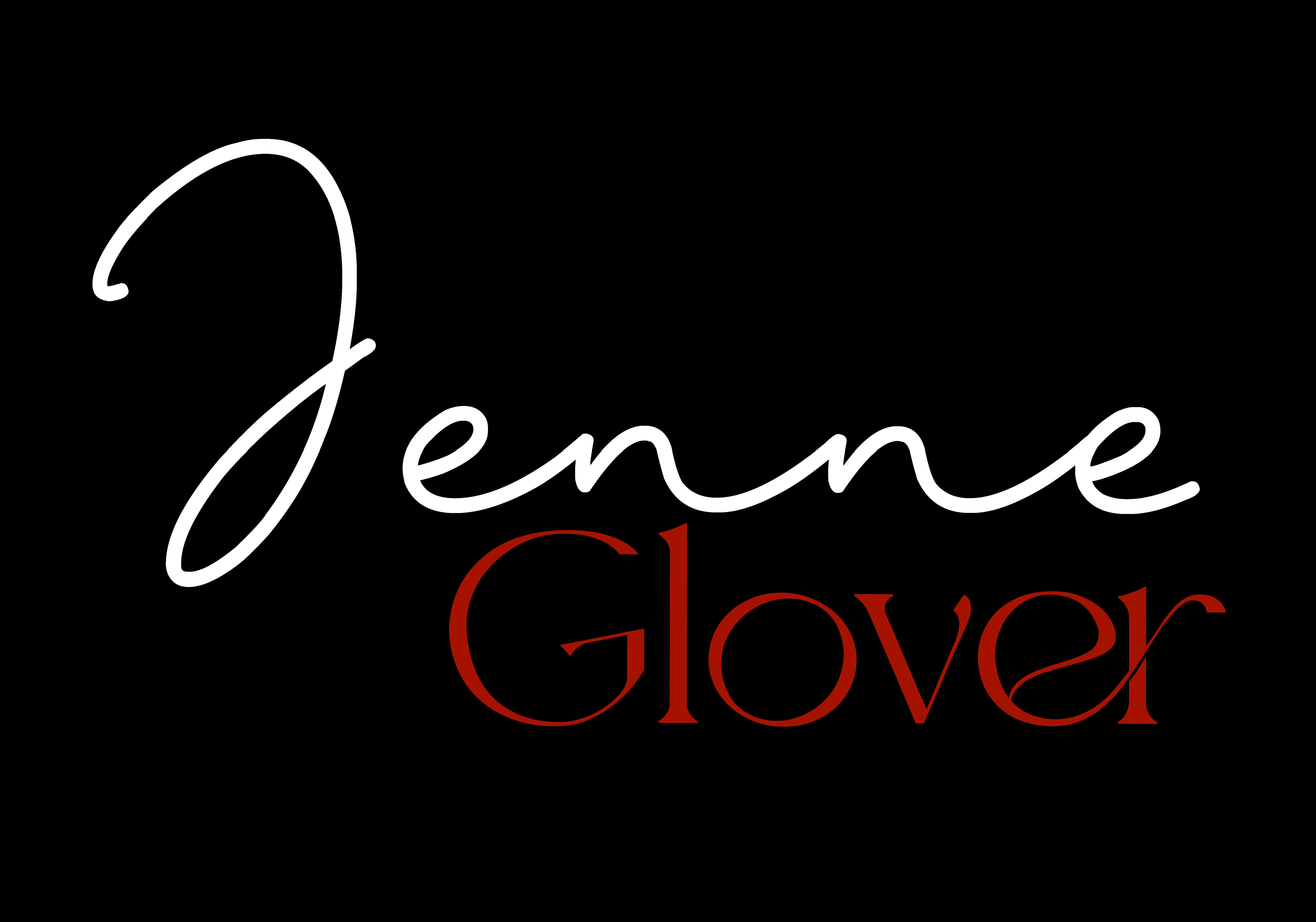In This Issue…
• Editor’s Perspective: Time Well Spent
• Queen Freedom featured in Black Creativity 2010 Juried Exhibition – Museum of Science and Industry, Chicago, IL – through February 28, 2010
• Contemporary Artist: Akili Ron Anderson, AfriCOBRA Artist
• Our Common Journey – Reception rescheduled to Sunday, February 14, 2010 – 11:30 a.m. to 1:30 p.m. – Village of Friendship Heights Center – 4433 South Park Ave., Chevy Chase, MD – Featuring: Anne S.Bouie, John Beckley, Daniel T. Brooking, Bernard W. Brooks, Gwendolyn Aqui – Brooks, James Brown Jr., Desiree Darden, Henry Elliott, Jenne Glover, T. H. Gomillion, Francine Haskins, Gloria C. Kirk, Jacqueline Lee, and Samuel Mercer
• The Uganda Art Consortium Exhibition – February 19 to 21, 2010 – Howard University, Blackburn Center – Fri. 5 p.m. to 8 p.m., Sat. & Sun. 11 a.m. to 5 p.m.
Editor’s Perspective: Time Well Spent
Two years have rolled by so quickly. And under stress, I’ve questioned whether I should continue writing Voicing Art because of the commitment it takes to put it together. After some soul searching it was clear to me that this is something that I must do. Some things are worth quitting, but reaching out to you feels right.
“There is no greater agony than bearing an untold story inside you.” Maya Angelou
Peace!

P.S.
Queen Harriett is featured in Black Creativity 2010 Juried Exhibition, at the Museum of Science and Industry, Chicago, IL – through February 28, 2010
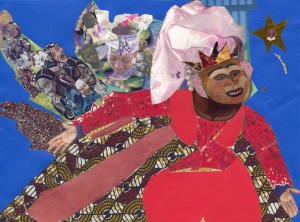
Jenne Glover
Mixed Media 12″ x 16″
Contemporary Artist: Akili Ron Anderson, AfriCOBRA Artist
Building…
Recycling…
Perfecting technique!!!
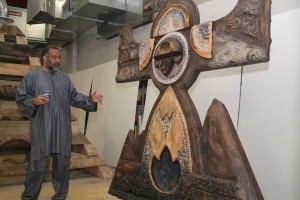
Akili discusses artwork – Creation
Wood and Plywood 12’ x 8’ x 6” 2007
Akili Ron Anderson wears many hats. He is a sculptor, stained glass artist, painter, print maker, photographer, filmmaker, administrator, and professor. A lifetime D.C. resident, he has practiced as a full-time visual artist for more than 30 years.
Akili is a member of AfriCOBRA (African Commune of Bad Relevant Artists) an artist collective that emerged in Chicago in the 1960’s and relocated its base to Howard University when its founder, Jeff Donaldson, became chairperson of Howard’s Art Department. This innovative art movement seeks to develop images that affirm and uplift the black community by capturing the vigor, energy, and spirit of African American culture through elements found in traditional African Art.
Along with his passion for art, Akili has a long standing commitment to community. He is co-founder of the NationHouse Positive Action Center, Watoto School, Sankofa Institute; and NATION, a music, visual arts, dance, and poetry performance ensemble. Both institutions have been around for more than 40 years. He has served as chairperson for the Visual Arts department at the Duke Ellington School of the Arts, as well as for the defunct Workshop for Careers in the Arts that was based at George Washington University. Most recently, he was on the faculty for the Department of Art at Howard University.
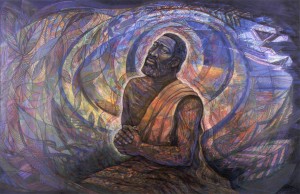
Jesus in the Garden
Mixed Media on Paper 26” x 40” 1994
Akili works around the clock and a typical work day can range from 8 to 16 hours. His parents fueled his love for the arts and his affinity for working with wood came naturally. His father, who was in the military, always had a carpentry shop at home where he did cabinet making. Akili always knew he had two things that he could do well, art and athletics, and after living a short time in segregated Lynchburg, Virginia, he knew he wanted to celebrate black culture.
He received a scholarship to the Corcoran School of Art, but being one of four black art students, he felt alienated. After a year at the Corcoran, he transferred to Howard University where black awareness was nurtured by a distinguished faculty that included James Wells and Lois Mailou Jones. Akili was also inspired by James Porter, Ed Love, and Elizabeth Catlett.
After earning a BFA in 1969, Akili worked with his mentor Robert Nash, an architect, restoring columns and repairing stained glass in the John Wesley AME Zion Church. He describes one project that was “trial by fire” and tested his commitment to working in this medium and environment. The project required repairing a termite damaged 30” x 30” skylight that had 30 separate windows and set atop a 4 story building. Although challenged to the max, he successfully completed the project and has since designed, fabricated, and installed stained glass throughout the Washington Metro Area.
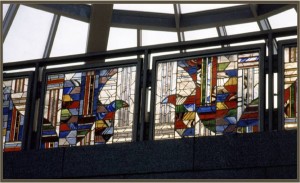
Columbia Heights Metro- West Station
WMATA features “Sankofa Bird I & II”, at the Columbia Heights Metro Station. Installed in 2002, it features birds in flight and is about moving forward while looking back to ensure that you don’t make the mistakes of the past. Akili says that while he was installing this work, he heard a boy tell his friend, “my metro station looks better than yours.” It was at that moment that he knew he was doing the right thing. Akili has also been contracted to install stained glass at the Prince George’s County Courthouse, Howard University Rankin Chapel, Union Temple Baptist Church, St. Augustine Catholic Church, and many other churches.
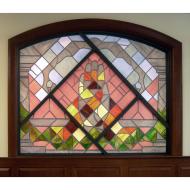
Prince George’s Courthouse window
Hand and Scale 2008
Akili says stained glass has taught him patience, precision, and structural integrity because working with glass is unforgiving. He compares making stained glass designs to dressmaking because you use patterns, and glass has distinctive swirls and designs much like fabric which requires determining what sections will be used. He notes that all of his stained glass creations are original conceptions, not stock designs.
Working in stained glass is very important to Akili because it makes a broad cultural statement. He considers this medium to be the most challenging because it is primarily public art work and breaking into this arena was not easy. He explains that most government projects allocate 2% of their budget to art, but only a small percent of the applicants will qualify. This market requires getting on a national registry to be screened and to validate that you have the credentials needed to do the job. In order to be considered, you’ve got to be credible, have relevant experience, and be able to work within short deadlines. In 2008, along with his many accomplishments, Akili added an MFA from Howard University to his credentials.
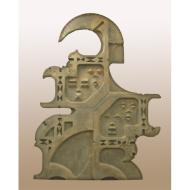
Sankofa
Laminated Plywood 12′ x 8′ x 5″ 2009
His shared studio is spacious and filled with his huge organic sculptures that are combinations of wood, fiber, glass resin, and soldate clay. Frequently he incorporates found objects and things people bring to him into his creations. He forges his work together with glue, screws, or construction adhesive. Akili likes integrating textures and contrasts into his work because it establishes energy with the viewer and helps to keep their attention.
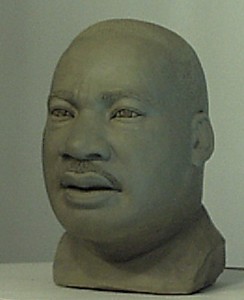
Martin Luther King
Clay 12” x 8” x 8”
Akili is a master of extremes, building mammoth free standing wood sculptures and constructing and installing stained glass designs require tremendous skill, spiritual balance, and respect for the elements. As he works, Akili talks to the materials he’s using to get their cooperation and support because he knows he has no room for error.
See more of Akili’s work at http://www.akilironanderson.com/Home_Page.php.
Our Common Journey — February 1 to February 28, 2010
Reception: Sunday, February 14, 2010 – 11:30 a.m. to 1:30 p.m.
Village of Friendship Heights Center
4433 South Park Avenue
Chevy Chase, MD
301-656-2797
Featuring:
Anne S.Bouie, John Beckley, Daniel T. Brooking, Bernard W. Brooks, Gwendolyn Aqui – Brooks, James Brown Jr., Desiree Darden, Henry Elliott, Jenne Glover, T. H. Gomillion, Francine Haskins, Gloria C. Kirk, Jacqueline Lee, and Samuel Mercer
The Uganda Art Consortium Exhibition & Sale
Featuring 6 Contemporary Ugandan Artists
Sponsored by Howard University African Students Association
February 19 – 21, 2010
Howard University – Blackburn Center
2400 6th Street, NW
Washington, DC 20059
Friday, Feb. 19 5 p.m. to 8 p.m.
Saturday, Feb. 20 11 a.m. to 5 p.m.
Sunday, Feb. 21 11 a.m. to 5 p.m.
Affordable fine art with a purpose: proceeds benefit HIV-AIDS patients, street children, and orphans in Uganda.
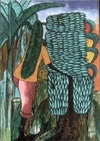
For more information on The Uganda Art Consortium, visit http://ugandart.com/tools/gallery.dwp?&tool=gallery&task=album&gallery_id=189&album_id=482
